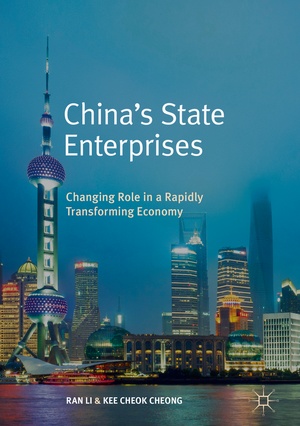China’s State Enterprises: Changing Role in a Rapidly Transforming Economy
Autor Ran Li, Kee Cheok Cheongen Limba Engleză Hardback – 20 iul 2018
This book focuses on the nature and significance of China’s state enterprises which have undergone substantial changes since China’s economic liberalization in 1978. It argues that much of the criticism is based on mistaken premises, where even the term ‘state-owned enterprises’ is a misnomer given that the emphasis is much less on ownership than on control. Using numerous case studies, this book highlights the extent to which these enterprises have evolved in response to reforms, and provides an in-depth analysis of their role in China’s outward investment strategy in the “Belt and Road” initiative. This role speaks to their growing influence as China expands her global footprint.
| Toate formatele și edițiile | Preț | Express |
|---|---|---|
| Paperback (1) | 445.86 lei 6-8 săpt. | |
| Springer Nature Singapore – 29 dec 2018 | 445.86 lei 6-8 săpt. | |
| Hardback (1) | 583.85 lei 6-8 săpt. | |
| Springer Nature Singapore – 20 iul 2018 | 583.85 lei 6-8 săpt. |
Preț: 583.85 lei
Preț vechi: 686.89 lei
-15% Nou
Puncte Express: 876
Preț estimativ în valută:
111.79€ • 114.67$ • 94.12£
111.79€ • 114.67$ • 94.12£
Carte tipărită la comandă
Livrare economică 26 februarie-12 martie
Preluare comenzi: 021 569.72.76
Specificații
ISBN-13: 9789811301759
ISBN-10: 9811301751
Pagini: 234
Ilustrații: XX, 216 p. 10 illus., 2 illus. in color.
Dimensiuni: 148 x 210 mm
Greutate: 0.54 kg
Ediția:1st ed. 2019
Editura: Springer Nature Singapore
Colecția Palgrave Macmillan
Locul publicării:Singapore, Singapore
ISBN-10: 9811301751
Pagini: 234
Ilustrații: XX, 216 p. 10 illus., 2 illus. in color.
Dimensiuni: 148 x 210 mm
Greutate: 0.54 kg
Ediția:1st ed. 2019
Editura: Springer Nature Singapore
Colecția Palgrave Macmillan
Locul publicării:Singapore, Singapore
Cuprins
1. Introduction.- 2. China’s State Enterprises – Theories and Evidence.- 3. State Enterprises, Economic Growth and Distribution.- 4. The State’s Role in a Strategic Industry – China’s Banking Sector.- 5. China’s “Commercial” State Enterprises – a Case Study of ZTE Corporation.- 6. “Going Out”, Going Global and the Belt and Road.- 7. Conclusion.
Recenzii
“The book is a great resource for those looking for a comprehensive and insightful review of ‘mainstream’ theories that are critical of SOEs, as well as ‘alternative’ theories that offer a more sympathetic treatment. … the book makes an important contribution by illuminating the need to consider both the explicit ownership and control mechanisms exercised by the government in addition to non-ownership related controls.” (Richard W. Carney, Journal of Contemporary Asia, June 18, 2019)
Notă biografică
Ran Li is Research Fellow at Institute of China Studies, University of Malaya. She obtained her doctoral degree in Economics from University of Malaya in 2014. She has been studying the Chinese state and state enterprises, and other research areas like development economics, urban economics and Chinese outward investment. Her specialization is in the transformation of China’s state enterprises, state enterprise system and China’s political-economic system, and her current areas of research include China’s global strategy and China-Malaysia economic relations. Her previous writings have appeared in a number of international journals such as China: An International Journal, Engineering Economics, Cities, International Journal of China Studies and Journal of Contemporary Asia.
Kee Cheok Cheong is currently Senior Research Fellow, Institute of China Studies, University of Malaya. A graduate of the University of Malaya, he obtained his PhD at the London School of Economics. He has held the positions of Dean at the Faculty of Economics and Administration, University of Malaya, and senior economist at the World Bank, Washington DC, for which he continues to consult after he left. Since his return, he has co-authored two books, book chapters, and published over 40 papers in academic journals. His research interests include economic development, transition economies particularly China and Vietnam, international economic relations, education and human capital, and economic history, specifically relating to the Chinese overseas.
Textul de pe ultima copertă
Finally, an insightful analysis of China’s different types of state-owned enterprises. Grounded in deep and thoughtful empirical research, China’s State Enterprises also contributes immensely to debate about the value of state intervention in an economy to drive growth. To understand how China is emerging as the world’s largest economy, guided by the strong hand of a highly interventionist state through enterprises it owns and controls, this is a must-read.
—Edmund Terence Gomez, Professor of Political Economy, University of Malaya
This study of China’s state owned and controlled enterprises challenges many of the easy assumptions about such enterprises made by high income country economists and business people. Through careful research and rigorous analysis the two authors argue that these enterprises have been transformed into effective vehicles for carrying out the government’s overall development strategy. The study is an important contribution to our understanding of the nature of China’s “socialist market economy”.
—Dwight H. Perkins, Professor of Political Economy, Harvard University
This book focuses on the nature and significance of China’s state enterprises which have undergone substantial changes since China’s economic liberalization in 1978. It argues that much of the criticism is based on mistaken premises, where even the term ‘state-owned enterprises’ is a misnomer given that the emphasis is much less on ownership than on control. Using numerous case studies, this book highlights the extent to which these enterprises have evolved in response to reforms, and provides an in-depth analysis of their role in China’s outward investment strategy in the “Belt and Road” initiative. This role speaks to their growing influence as China expands her global footprint.
Caracteristici
Looks beyond the mainstream economic yardsticks to measure China's state enterprise performance Eschews macro-analysis in favor of in-depth firm and sector-level analysis to provide a broader picture of the strategic role of these enterprises Provides an in-depth analysis of the upcoming role of China's state enterprises in the “Belt and Road” initiative
